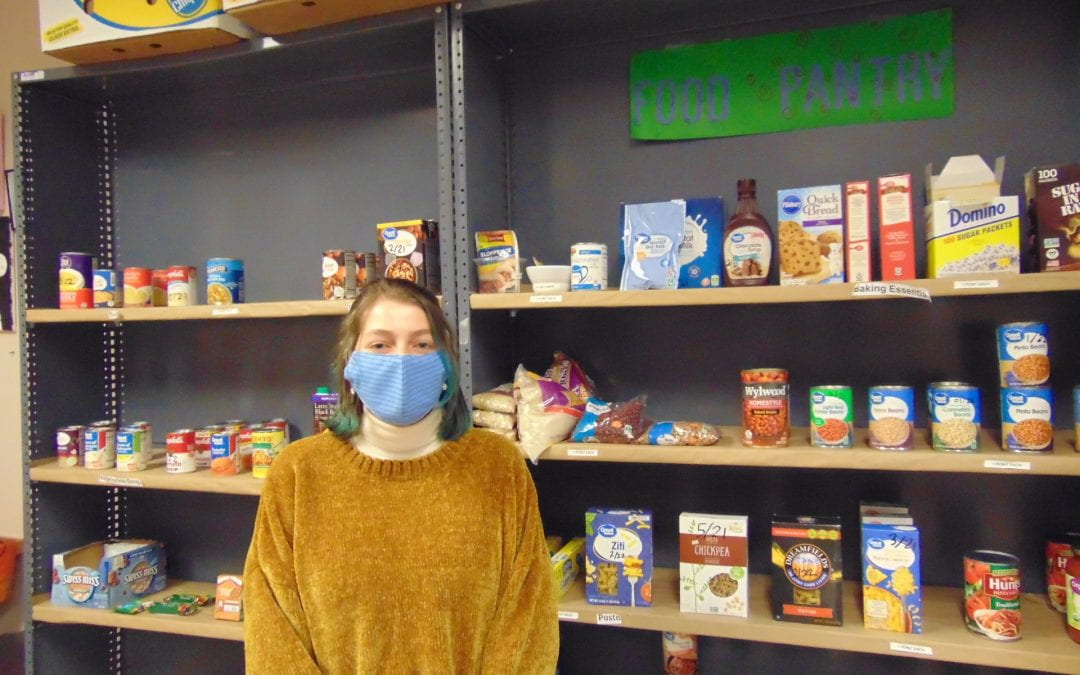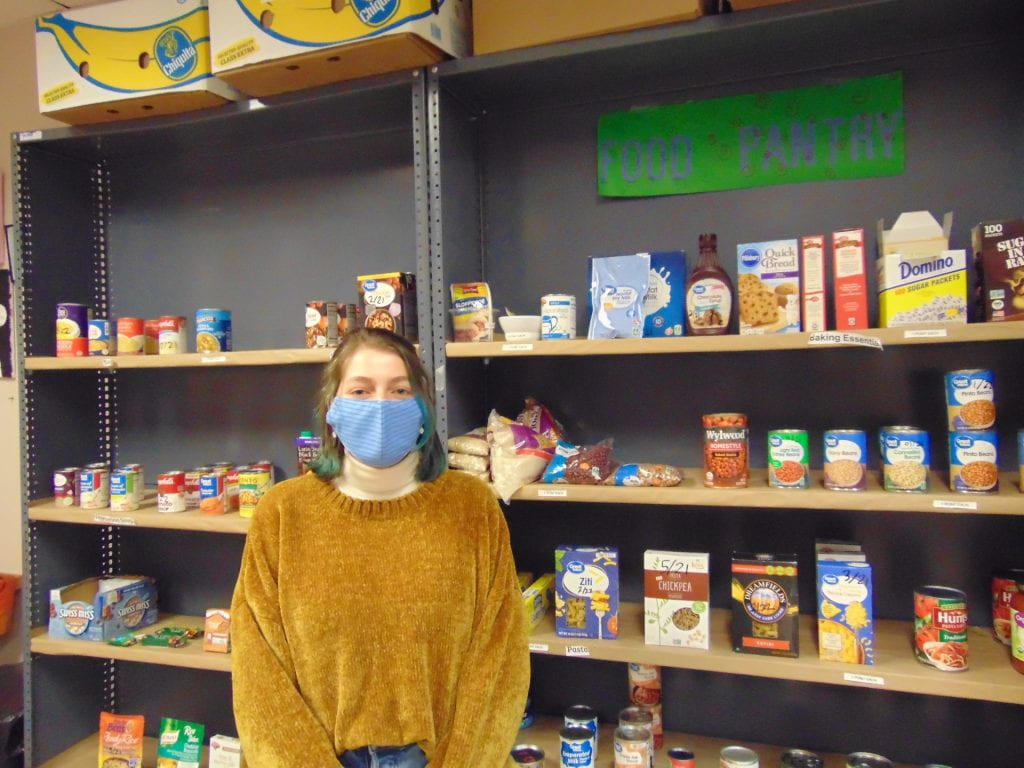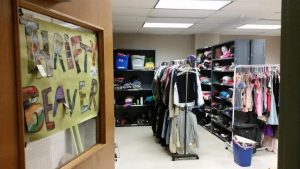Dec 16, 2021 | Exclusive, Feature, News |
By Paige Lusczyk, contributing writer
The Sustainable Campus Coalition (SCC) celebrated its 20th anniversary on Oct. 29th in the Landing. UMF’s President Serna spoke at the event.
President Serna congratulated the SCC for creating an impact at UMF. “…Walk around this campus-especially as a tour… as outsiders-and you really start to feel the impact you have had on the physical campus,” Serna said.
President Serna continued to list off the accomplishments of the SCC including the biomass plant, the community garden, the Thrifty Beaver, and the wells. The wells were installed in 2012 as ground source heating. The Biomass plant was completed in 2016 and will replace about 390,000 gallons of heating oil previously used annually. The Thrifty Beaver was also established in 2016, an active place for those who need help with food insecurity. The community garden was established last year to also raise awareness of food insecurity on campus while supplying organic produce to the community.
The SCC was founded in 2001 with an original focus on the Education Center and its Green design. Today, “the mission of the SCC has expanded to include public education, collaborations with the community, environmental planning associated with greenhouse gas emissions, improvement of recycling on campus, encouragement of local food, institutional composting, and sustainable transportation.”
“It’s not just how [the SCC] shaped the physical campus, I think it is also how [the SCC] shaped our values and culture here on campus,” President Serna said.
UMF’s Campus Sustainability Coordinator, Mark Pires, thanked all alumni and current students involved with the SCC over the past 20 years, then everyone else that were heavily involved in the project. “SCC projects and activities are driven by the interests and passions of UMF students who work in collaboration with a team of dedicated faculty, staff, and community members,” Pires said.
The SCC meets on Mondays from 11:45 a.m. to 1 p.m. in room 113 in the Education Center. Please contact Pires at edward.pires@maine.edu for more information.
Nov 1, 2021 | Feature |
By Annie Newman, Staff Writer
Even in October, the garden that sits next to the Student Olsen Center is teeming with life. Brilliant flowers bloom, vegetables ripen, and bees take pollen to ready themselves for winter. Students mill about, especially those that are in the “Dig It: Gardening for Change” class hosted by student advisor and teacher Gretchen Legler.
“What we do is we read people who are writing about how we need to change the way we grow food in America and across the world to make it less fossil-fuel dependent– so how we need to change the way we grow food and how we change the way we make food available to people,” Legler explained.
As well as reading and studying methods of change, students also work in the garden and donate the produce to put their lessons into practice. “We’ve worked in the garden, we planted things, we’ve nurtured things, we harvested things, and delivered them to [Saint Joseph’s] Nutrition Center, which is just up the street and is a free place for people to go 24/7 to get nutritious fresh food,” Legler said. St. Joseph’s Nutrition Center is also available to students.
Those that were on campus before the garden arrived may remember the Creative Writing building that stood next to the Student Olsen Center. But how did the garden come to be? “The garden was made possible by a grant from something called the Ella Lyman Cabot Trust,” Legler said. “It’s a Boston-based organization that likes to fund projects that help change the world for the better with an environmental focus. All of the wood here, the topsoil, the seeds, the greenhouse– it all was because of that grant.”
Legler has also detailed the different kinds of vegetables, herbs and flowers being grown in the garden: catnip, gourds, marigolds and more. “All of the work that has been done in this garden has been done by students. All of the building of the beds, the filling the beds with soil, starting all the plants, planting everything, taking care of it over the summer– it’s all been done by students,” Legler noted. Though deer have been nibbling at the growth that has been uncovered by the netting, the garden is considered a great success.
“I want people to know that they can come to the garden anytime and enjoy it,” Legler added. Most of the produce is reserved for food banks such as St. Joseph’s Nutrition Center and soon the Thrifty Beaver, but the garden is a good place to look at the growth and “rejuvenate your soul,” as Legler puts it.
If you are interested in an apprenticeship or work-study around the garden, contact Gretchen Legler at: gretchen.legler@maine.edu.

Nov 12, 2020 | Uncategorized |
By Madison Archer, Contributing Writer

Twilight Smart-Benson, one of the Thrifty Beaver’s student workers. (Photo courtesy of Sam Shirley)
In the basement of the Fusion Center there is a room filled with donated supplies. Clothes, food, kitchen supplies, school supplies, textbooks and personal hygiene items. The Thrifty Beaver (TB) is a student-run food pantry and clothing exchange, aimed at helping UMF students “not fall through the cracks” said Mark Pires, Interim Sustainability Coordinator.
The Thrifty Beaver (TB) has made some compromises in how it is run to ensure safety is possible for students. Reduced hours and limited stock have proven to be struggles for the Thrifty Beaver.
Although new to campus, Pires has been hard at work along with its dedicated student workers trying to help the “Thrifty” get ready for students to utilize during the pandemic. Pires and the student workers have had to put away some items, like kitchenware, due to concerns of touching and passing items around. They also shut down the fitting room where students could try on the clothes that have been donated.
There is only one person allowed in TB at once and there is space in the hallway for students to wait as well. Things like prearranged hygiene bags are ready for TB customers to grab and go.
TB relies on donations from the UMF community and the Farmington community. “Typically our funds are given from the school. So we will have a once a month, big shopping trip that is school funded. That allows us to supply food to all kinds of students,” said Chelsea Roy, a sophomore environmental science and anthropology major. Roy is also involved with Sustainability Campus Coalition (SCC) which is the group that manages Thrifty Beaver.
In the past, donations have come in from current students, alumni, professors, The United Way and The University Credit Union. Alumni acknowledge the significance of the Thrifty Beaver. “Alums come in still,” said Roy. “I ran into an alum my last shift! She recognized that the Thrifty was a really vital resource and she came back to donate food.”
There are about a half dozen students employed by TB in addition to volunteering students. Pires had nothing but praise to give to the students who have been keeping the TB open. “As I become more familiar with the members of the SCC, I think that their devotion and commitment to keeping the Thrifty Beaver up and running even during COVID times is really impressive,” said Pires.
Both Pires and Roy agree that the TB is important to the campus and its students. “You know many students are on very tight budgets,” said Pires. “Here and at other campuses they might not have the resources for a full meal plan every semester. I think organizations like the SCC and TB fill an important role and need.”
Some upcoming projects that the TB is working towards includes making a commercial to feature well-known figures on campus. The other project is revamping their website to include an updated catalog of their inventory.
The Thrifty Beaver is located in the basement of the Fusion Center. They’re open Thursdays and Sundays from 4 p.m. to 7 p.m.

Nov 18, 2017 | Exclusive |
By Leah Boucher – Staff Reporter
UMF’s Thrifty Beaver Cooperative has recently completed changes in the location and services they offer in an effort to help hungry students and those who need new clothing for the winter.

The Thrify Beaver Co-op is now located in the basement of the Fusion Center. (Photo Courtesy of Danica Lamontagne)
Now located in the basement of the new Fusion Center building, students can receive any food in the food pantry for free and can participate in a clothing swap, where the number of clothes they bring in to donate is the number of clothes they can take from the store in return.
Originally developed by the UMF Sustainable Campus Coalition (SCC), Thrifty Beaver expanded in the past year from a simple thrift store on the third floor of Merrill to a thrift store and food pantry in a more central campus location near the Olsen Student Center. Luke Kellett, UMF Sustainability Coordinator and Assistant Professor of Anthropology, hopes that this change will allow students to feel more comfortable if they are in need of food or clothes.
“We intentionally combined the food pantry with the campus thrift store to reduce the stigma of accessing a food pantry,” said Kellett. “We are now one of over 400 university/college food pantries in the US, so this is a rapidly growing trend which shows that higher education is taking food insecurity and hunger seriously, an issue which has generally seen very little attention up until the last few years.”
As this semester winds down and students run out of meals on campus, this co-op hopes to provide frozen meals for students in need with a new refrigerator/freezer they received due to a grant.
“Foods like frozen burritos, pizza pockets, and so on will be available for students to eat right away or store in their own refrigerators in their rooms or off campus,” said Kellett. “Not only will the food pantry have an increase of meals for the cold season, but Thrifty Beaver also sees an increase in the amount of clothes donated right before and during the winter months.”
Danica Lamontagne, a senior double majoring in Environmental Policy and Planning and Political Science, is a Thrifty Beaver student worker who is aware of the rising issue of student hunger and need for warm clothes. “It’s sometimes hard for students to access local food pantries or clothing swaps, and they might feel ashamed visiting one of those facilities,” said Lamontagne. “Thrifty Beaver tries to normalize itself as a comfortable, local resource to be a part of; student hunger and students with lack of appropriate winter clothing is a serious issue not only on campus but in this country.”
Kelly Toomey, a junior Secondary Education and Environmental Science major and student leader of the SCC, is trying to publicize the services offered within Thrifty Beaver and increase student interest.
“At the beginning of November, we partnered with Johnson Scholars. They handed out cookies in the student center with a free coupon to Thrifty Beaver, a map of how to get there, and a chance to enter a raffle to win a Narrow Gauge Cinemas movie pass or a Hannaford gift card,” said Toomey. “We also have new signs in the front and back of the Fusion Center and maintain a website and Facebook page for those who want to know more about what we offer.”
Kellett believes that there will be more student interest and involvement, as foot traffic will increase when the Fusion Center is finally completed. However, he knows time is needed for any type of major increase in the number of student visitors.
“I have talked to other universities who have food pantries, thrift stores, or similar co-ops such as Thrifty Beaver. They have all informed me that it takes time for new services to be accessed,” he said. “That means we need to be patient yet engaged in keeping the co-op visible and active on campus.”
The Thrifty Beaver Co-op is located in room 004 in the basement of the Fusion Center and is open Sunday, Monday, and Thursday from 3-8.


